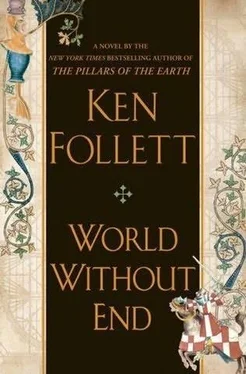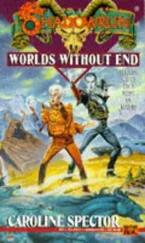“If you hear that I’ve died,” Thomas had said to the boy Merthin, “I’d like you to dig up this letter and give it to a priest.”
Merthin the man hefted his spade and began to dig.
He was not sure whether this was what Thomas had intended. The buried letter was a precaution against Thomas’s being killed by violence, not dying of natural causes at the age of fifty-eight. Would he still have wanted the letter dug up? Merthin did not know. He would decide what to do when he had read the letter. He was irresistibly curious about what was in it.
His memory of where he had buried the bag was not perfect, and with his first try he missed the spot. He got down about eighteen inches and realized his mistake: the hole had been only about a foot deep, he was sure. He tried again a few inches to the left.
This time he got it right.
A foot down, the spade struck something that was not earth. It was soft, but unyielding. He put the spade to one side and scrabbled with his fingers in the hole. He felt a piece of ancient, rotting leather. Gently, he dislodged the earth and lifted the object. It was the wallet Thomas had worn on his belt all those years ago.
He wiped his muddy hands on his tunic and opened it.
Inside was a bag made of oiled wool, still intact. He loosened the drawstring of the bag and reached in. He pulled out a sheet of parchment, rolled into a scroll and sealed with wax.
He handled it gently, but all the same the wax crumbled as soon as he touched it. With careful fingertips he unrolled the parchment. It was intact: it had survived thirty-four years in the earth remarkably well.
He saw immediately that it was not an official document but a personal letter. He could tell by the handwriting, which was the painstaking scrawl of an educated nobleman, rather than the practised script of a clerk.
He began to read. The salutation ran:
From Edward, the second of that name, King of England, at Berkeley Castle; by the hand of his faithful servant, Sir Thomas Langley; to his beloved eldest son, Edward; royal greeting and fatherly love.
Merthin felt scared. This was a message from the old king to the new. The hand holding the document shook, and he looked up from it and scanned the greenery around him, as if there might be someone peering at him through the bushes.
My beloved son, you will soon hear that I am dead. Know that it is not true.
Merthin frowned. This was not what he had expected.
Your mother, the queen, the wife of my heart, has corrupted and subverted Roland, earl of Shiring, and his sons, who sent murderers here; but I was forewarned by Thomas, and the murderers were killed.
So Thomas had not been the assassin, after all, but the saviour of the king.
Your mother, having failed to kill me once, would surely try again, for she and her adulterous consort cannot feel safe while I live. So I have changed clothes with one of the slain murderers, a man of my height and general appearance, and I have bribed several people to swear that the dead body is mine. Your mother will know the truth when she sees the body, but she will go along with the pretence; for if I am thought to be dead, I will be no threat to her, and no rebel or rival to the throne can claim my support.
Merthin was amazed. The nation had thought Edward II to be dead. All Europe had been fooled.
But what had happened to him afterwards?
I will not tell you where I plan to go, but know that I intend to leave my kingdom of England and never return. However, I pray that I will again see you, my son, before I die.
Why had Thomas buried this letter instead of delivering it? Because he had feared for his own life, and had seen the letter as a powerful weapon in his defence. Once Queen Isabella had committed herself to the pretence of her husband’s death, she had needed to deal with those few people who knew the truth. Merthin now recalled that while he was still an adolescent the earl of Kent had been convicted of treason and beheaded for maintaining that Edward II was still alive.
Queen Isabella had sent men to kill Thomas, and they had caught up with him just outside Kingsbridge. But Thomas had disposed of them, with the help of the ten-year-old Ralph. Afterwards, Thomas must have threatened to expose the whole deception – and he had proof, in the form of the old king’s letter. That evening, as he lay in the hospital at Kingsbridge Priory, Thomas had negotiated with the queen, or more likely with Earl Roland and his sons as her agents. He had promised to keep the secret, on condition that he was accepted as a monk. He would feel safe in the monastery – and, in case the queen should be tempted to renege, he had said that the letter was in a safe place and would be revealed on his death. The queen therefore needed to keep him alive.
Old Prior Anthony had known something of this, and as he lay dying had told Mother Cecilia, who on her own deathbed had repeated part of the story to Caris. People might keep secrets for decades, Merthin reflected, but they felt compelled to tell the truth when death was near. Caris had also seen the incriminating document that gave Lynn Grange to the priory on condition Thomas was accepted as a monk. Merthin now understood why Caris’s disingenuous inquiries about this document had caused such trouble. Sir Gregory Longfellow had persuaded Ralph to break into the monastery and steal all the nuns’ charters in the hope of finding the incriminating letter.
Had the destructive power of this sheet of vellum been lessened by the passage of time? Isabella had lived a long life, but she had died three years ago. Edward II himself was almost certainly dead – if alive he would be seventy-seven now. Would Edward III fear the revelation that his father had remained alive when the world thought him dead? He was too strong a king, now, to be seriously threatened, but he would face great embarrassment and humiliation.
So what was Merthin to do?
He remained where he was, on the grassy floor of the forest among the wild flowers, for a long time. At last he rolled up the scroll, replaced it in the bag and put the bag back in the old leather pouch.
He put the pouch back into the ground and filled up the hole. He also filled in his first, erroneous hole. He smoothed the earth on top of both. He stripped some leaves off the bushes and scattered them in front of the oak tree. He stood back and looked at his work. He was satisfied: the excavations were no longer visible to the casual glance.
Then he turned his back on the clearing and went home.
At the end of August, Earl Ralph made a tour of his landholdings around Shiring, accompanied by his long-term sidekick, Sir Alan Fernhill, and his new-found son, Sam. He enjoyed having Sam along, his child yet a grown man. His other sons, Gerry and Roley, were too young for this son of thing. Sam did not know about his paternity, but Ralph nursed the secret with pleasure.
They were horrified by what they saw as they went around. Hundreds of Ralph’s serfs were dead or dying, and the corn was standing unharvested in the fields. As they rode from one place to the next, Ralph’s anger and frustration grew. His sarcastic remarks cowed his companions, and his bad temper turned his horse skittish.
In each village, as well as the serfs’ landholdings, some acres were kept exclusively for the earl’s personal use. They should have been cultivated by his employees and by serfs who were obliged to work for him one day a week. These lands were in the worst state of all. Many of his employees had died; so had some of the serfs who owed him labour; other serfs had negotiated more favourable tenancies after the last plague, so that they no longer had to work for the lord; and, finally, it was impossible to find labourers for hire.
Читать дальше












